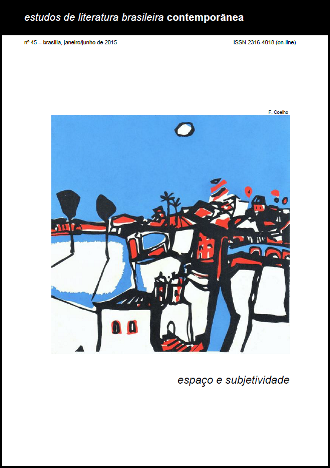O espaço urbano como construção poética do sujeito
DOI:
https://doi.org/10.1590/2316-4018455Abstract
Este é um estudo crítico-analítico acerca de alguns poemas do poeta brasileiro Fábio Weintraub em termos da construção do espaço da poesia como um olhar crítico e poético do sujeito. O aspecto lírico do trabalho do poeta é objetivo e sensível ao dirigir-se à s cenas urbanas nas quais os objetos desempenham um papel como imagens de um cotidiano das cidades cujo espaço é performatizado como drama do próprio sujeito que olha a cena.
Downloads
References
ACHCAR, Francisco (1994). Lírica e lugar-comum: alguns temas de Horácio e sua presença em português. São Paulo: Ed. USP.
CARERI, Francesco (2014). Walkscapes: o caminhar como prática estética. Tradução de Frederico Bonaldo. São Paulo: Gilli, 2014.
DaMATTA, Roberto (1979). A casa e a rua. In: DaMATTA, Roberto. Carnavais, malandros e heróis. Rio de Janeiro: Zahar.
JACOBS, Jane. The death and life of great American cities (1961). New York: Random House.
MERLEAU-PONTY, Maurice (1971). Fenomenologia da percepção. Tradução de Reginaldo di Piero. São Paulo: Freitas Bastos.
MERLEAU-PONTY, Maurice (2009). O olho e o espírito. 7. ed. Lisboa: Vega.
SANSOT, Pierre (2004). Poétique de la ville. Paris: Petite Bibliothèque Payot.
VALÉRY, Paul (1984). A serpente e o pensar. Tradução de Augusto de Campos. São Paulo: Brasiliense.
ZUMTHOR, Paul (2014). Performance, recepção, leitura. Tradução de Jerusa Pires Ferreira e Suely Fenerich. São Paulo: Cosac Naify.
WEINTRAUB, Fábio (2002). Novo endereço. São Paulo: Nankin, 2002.
WEINTRAUB, Fábio (2007). Baque. São Paulo: 34, 2007.
Downloads
Published
How to Cite
Issue
Section
License
Authors who publish in this journal agree to the following terms:
a) The authors maintain the copyright and grant the journal the right of first publication, the work being simultaneously licensed under the Creative Commons Attribution License-Non Commercial 4.0 which allows the sharing of the work with acknowledgment of the authorship of the work and publication this journal.
b) Authors are authorized to enter into additional contracts separately, for non-exclusive distribution of the version of the work published in this journal (eg publish in institutional repository or as a book chapter), with authorship recognition and publication in this journal.
c) Authors are allowed and encouraged to publish and distribute their work online (eg in institutional repositories or on their personal page) after the editorial process, as this can generate productive changes, as well as increase the impact and citation of published work (See The Effect of Free Access).
d) The authors of the approved works authorize the magazine to, after publication, transfer its content for reproduction in content crawlers, virtual libraries and the like.
e) The authors assume that the texts submitted to the publication are of their original creation, being fully responsible for their content in the event of possible opposition by third parties.


